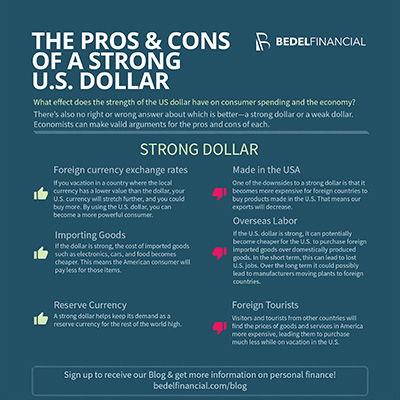
Currency exchange rates around the globe are constantly fluctuating, including our U.S. dollar. At present, the U.S. dollar is “strong.” And that’s good, right? Not necessarily. Let’s take a basic, top-level look at what determines the strength of a currency and the effect it has on consumer spending and the economy in general.
What Determines the Strength of a Currency?
What exactly does it mean for a currency to be “strong” or “weak?” A currency is “strong” if it is becoming more valuable relative to another country’s currency. Conversely, a currency is considered “weak” if it is becoming less valuable versus another country’s currency.
So how does one currency become stronger or weaker than another currency? Many factors are involved in currency trading and it is rather complicated, so the answer isn’t exactly black and white. However, according to Richard Barrington, the primary spokesperson and personal finance expert for MoneyRates.com, three crucial factors influence a currency’s strength:
- Interest rates – Relatively higher interest rates are attractive to foreign investors seeking a higher rate of return. Their investment helps promote a stronger currency because as they purchase the currency, it increases demand and price.
- Economic policies – Fiscal discipline and anti-inflationary monetary policies help promote a strong currency because these policies can help keep inflation and debt in check. Higher inflation and government debt can be bad for a country’s currency.
- Stability – A strong, well-established government is attractive to investors and promotes a strong currency because investors are more confident in the solidity of the currency.
Implications of a Strong Currency
A strong currency has its pros and cons. Let’s use the U.S. dollar to show the implications a strong currency has for the general economy and your pocketbook.
Here’s one example of how a strong U.S. dollar can work in your favor. This past summer the British pound sterling plunged to a thirty-year low against the U.S. dollar. This drop was largely because of Brexit. The U.S. dollar was very strong compared to the pound since a dollar could buy more pounds than it could previously. So, if you vacationed in London this summer, your U.S. dollars stretched further and you could buy more for the same amount of money. By using the U.S. dollar in Britain, you became a more powerful consumer.
This also holds true for the U.S. economy in general. If the dollar is strong, then the cost of imported goods such as electronics, cars, and food becomes cheaper. This means the American consumer will pay less for those items. All of that sounds great, right? Well, there are two sides to every coin.
One of the downsides to a strong dollar is that it becomes more expensive for foreign countries to buy products made in the U.S. That means our exports will decrease. This is a disadvantage for U.S. producers in the global market because foreign countries will look elsewhere to find less-expensive products.
In addition, if the U.S. dollar is strong, it can potentially become cheaper for the U.S. to purchase foreign imported goods over domestically produced goods. In the short term, this can lead to lost U.S. jobs. Over the long term it could possibly lead to manufacturers moving plants to foreign countries. And, that’s not so good!
Implications of a Weak Dollar
A weak currency also has its pros and cons. Let’s look at the example above, but this time we’ll assume the U.S. dollar plunged to a thirty-year low against the British pound. That would make the same vacation to London very expensive since the U.S. dollar won’t purchase nearly as much under these circumstances.
Again, the same is true for the U.S. economy. Imports from foreign countries become very expensive when the U.S. dollar is weak. The same electronics, cars, and food produced in other countries, will now cost you much more.
The good news is a weak U.S. dollar means goods produced in the U.S. become more competitive in the global market. Further, as imports from foreign countries become more expensive, Americans will purchase more domestically produced goods than imported goods. This increase in sales may boost economic growth, resulting in job creation in the manufacturing sector to meet the increase in global demand.
Summary
I wish I could say this brief overview is all you’ll need to know about currency fluctuation, but the truth is, it’s much more complicated. There’s also no right or wrong answer about which is better—a strong U.S. dollar or a weak U.S. dollar. Economists can make valid arguments for the pros and cons of each. Now that you have a better understanding of the basics of currency strengths and weaknesses, you’ll have the tools you need to further your knowledge on the topic and stay informed.
Schedule a Consultation
We have helped our clients answer these questions and more. If you want a clear understanding of your financial future, and need help making changes to reach your goals, schedule a consultation and we can get started.
The material has been gathered from sources believed to be reliable, however Bedel Financial Consulting, Inc. cannot guarantee the accuracy or completeness of such information, and certain information presented here may have been condensed or summarized from its original source. To determine which investments or planning strategies may be appropriate for you, consult your financial advisor or other industry professional prior to investing or implementing a planning strategy. This article is not intended to provide investment, tax or legal advice, and nothing contained in these materials should be taken as such. Investment Advisory services are offered through Bedel Financial Consulting, Inc. Advisory services are only offered where Bedel Financial Consulting, Inc. and its representatives are properly licensed or exempt from licensure. No advice may be rendered unless a client agreement is in place.
Recommended Articles
Embracing Digital Innovation: Understanding the New Cryptocurrency Reserve
On March 6th, the Trump administration announced the...





